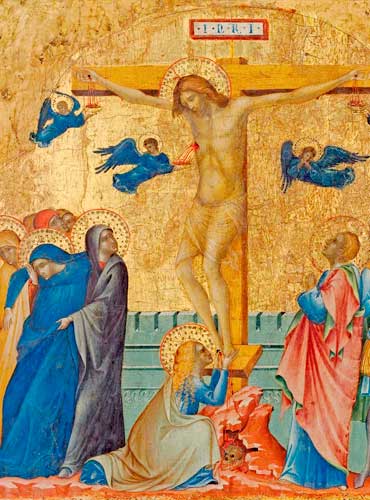*Cfr. Charles Journet, La Misa, presencia del sacrifico de la cruz (Bilbao 1962) 26-31.
I
The supreme act by which Jesus Christ, through His death on the cross, founded a universe of redemption is called His “Hour.” His entire life is dominated by the idea of His Hour: the Hour of His Passion and the Hour of His return to the Father.
In Cana He said: My hour has not yet come (Jn 2:4). If He advanced it at the Virgin Mary’s request, He knew that the Hour of his death would also draw near. His Hour does not depend on the will of men but rather on the will of the Father: So they tried to arrest him, but no one laid a hand upon him, because his hour had not yet come (Jn 7:30); but no one arrested him, because his hour had not yet come (Jn 8:20). Jesus’ Hour indicates His passing through death to the glory where He would lead all those who were His own: The hour has come for the Son of Man to be glorified. Amen, amen, I say to you, unless a grain of wheat falls to the ground and dies, it remains just a grain of wheat; but if it dies, it produces much fruit. I am troubled now. Yet what should I say? ‘Father, save me from this hour’? But it was for this purpose that I came to this hour (Jn 12:23-24, 27). This is the Hour of His glorification: He raised his eyes to heaven and said, ‘Father, the hour has come. Give glory to your son, so that your son may glorify you, just as you gave him authority over all people, so that he may give eternal life to all you gave him’ (Jn 17:1-2). It is the Hour of His passing to the Father: Before the feast of Passover, Jesus knew that his hour had come to pass from this world to the Father. He loved his own in the world and he loved them to the end (Jn 13:1).
II
Jesus knew that hour in advance: When Jesus finished all these words, he said to his disciples, ‘You know that in two days’ time it will be Passover, and the Son of Man will be handed over to be crucified’ (Mt 26:1-2). He knew all of the circumstances. This Hour preoccupied Him. With its mystery, it colored the silence of His hidden life and the different steps of His public life. It is present in the Incarnation of the Word: It is impossible that the blood of bulls and goats take away sins. For this reason, when he came into the world, he said: “Sacrifice and offering you did not desire, but a body you prepared for me; holocausts and sin offerings you took no delight in. Then I said, ‘As is written of me in the scroll, Behold, I come to do your will, O God.’”
First he says, “Sacrifices and offerings, holocausts and sin offerings, you neither desired nor delighted in.” These are offered according to the law. Then he says, “Behold, I come to do your will.” He takes away the first to establish the second (Heb 10:4-9).
III
This Hour summarizes His entire temporal life. All of the acts of His life, acts which had an infinite value, were offered as a part of the whole that would be completed by the Passion. It summarizes the world’s entire history and all of its future: His Hour was to recapitulate the heavens and the earth. Saint Irenaeus wrote, “These things would not be rescued if they had not been saved; nor would the Lord have summed up these things in Himself, unless He had Himself been made flesh and blood . . . saving in his own person at the end that which had in the beginning perished.”[1] Saint Jerome commented, “It is on the Cross of the Lord and in His Passion where all things have been summed up; all things have been embraced by this summary.”[2]
IV
His Hour projects itself onto the Resurrection and the Ascension. His death contained the Resurrection, His suffering happiness, His defeat a victory that cannot fade.
Christ’s hour is the world’s most solemn hour. It is well-marked in time: 14th Nissan of the year 33, according to our count, from 12 to 3 pm. However, it continues to dominate all times. The cross embraces all of the past and all of the future. It saves those times yet to come by anticipation. It saves those times past by application or derivation. All of the graces of the New Law flow from the Cross: without the shedding of blood there is no forgiveness (Heb 9:22).
The priest is the one who actualizes the Hour of Christ. It is he who strikes the Hours on the watch of Jesus when he preach-es, baptizes, confesses, and celebrates the Holy Mass, because the sacrifice of the Cross was offered once forever, but it is to be actualized without ceasing. We can say that his work is to make the fruits of the sacrifice of the cross come to each man of every generation. Christ wants the Church of yesterday, of today, and of tomorrow to root herself in Him and in His sacrifice.
The Virgin Mary and Saint John were at the foot of the cross, representing the Church. To the infinite offering of the God-man, Christ adds the finite created offering. This participation in the oblation of Christ, a participation that was liturgical, sacrificial, and loving, was done by means of an immediate contact (that is, without recourse to sacramental signs or the unbloody rite). This contact was transient; it was a contemporaneous presence (we are excluded from this sort of presence).
There is, however, another way of participating fully and permanently in the drama of Redemption. This is when we offer God the bloody Sacrifice in the wrapping of the unbloody sacrifice of the Mass. This is our privilege, and it is a presence of spiritual contact. There is nothing that prevents this presence from reaching us. Through the work of priests, a ray from the bloodied Cross moves itself along the succeeding generations to come at every Mass, to penetrate us in our own time. It makes us adhere to and penetrate into the mystery of redemption. It makes us dis-cover our place with Him, unite ourselves to His offering, and supplicate with Him. It opens for us the graces which He desires to shower upon us.
Christ wanted the Cross, the Sacrifice of the Cross, to not be just some past event, but rather something present to us. He wanted it to be transported, as it were, over the river of time.
As a result of the spiritual power of the divinity to which it is united, Christ’s Passion exercises its influence by spiritual contact, as Saint Thomas says. By this, the Angelic Doctor means that the Passion exercises its influence by means of faith and the sacraments through faith in his blood (cf. Rom 3:25). In another place, the Angelic Doctor writes that “the power of Christ’s Passion is unit-ed to us by faith and the sacraments . . . the link that comes from faith is produced by an act of the soul; whereas the link that comes from the sacraments is produced by making use of exterior things.”[3]
[1] Cf. Saint Irenaeus, Adversus haereses, V, 14, 1; PG VII.
[2] Saint Jerome, Comm. Ad Ephes., I,10; PL XXVI.
[3] Saint Thomas Aquinas, S. Th., III, q. 62, a. 6.







